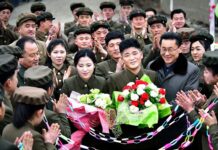The Hwagyo,
North Korea’s
community of overseas Chinese, are seeing their value rise in response to demand
for assistance transporting cross-border freight for local traders hamstrung
by their proscribed freedom of movement, according to a source inside North
Korea. The local traders refer to the process as “renting a passport”.
The
source in North Pyongan Province reported to Daily NK on July 28th, “Pyongyang Hwagyo
are catering to the tastes of middle-class consumers in the city’s markets by taking
orders from individuals or by bringing in goods on the behalf of traders.
“The
measles outbreak prevented Pyongyang hwagyo in Pyongyang from taking the
cross-border train, but recently that ban was lifted so they can come and go
from Dandong again.” The measles travel ban was put in place during June in Yongcheon
and Sinuiju, but was withdrawn on July 15th.
Hwagyo are treated as citizens in North Korea, carrying
the same identification cards as all other residents; however, they are also
able to hold Chinese passports, which allows for greater mobility and autonomy than
other North Koreans. That is the reason for the high demand; North Korean
traders and wholesalers employ them to ensure that their supplies arrive from
China.
“Although there are a
lot of hwagyo from Sinuiju and elsewhere in Dandong, Pyongyang hwagyo
are the ones who get hired the most because the train ends in Pyongyang; This
makes it easier to get
the goods into circulation, and
the procedures there are not as stringent,” the source reported. “This has
caused their value to rise.”
“The hwagyo either
use their own money to get products to sell in Pyongyang markets directly, or they
use money from traders and take 5% of the total upon delivery,” she said. “They
take commission for transferring goods from the cross-border trains to
merchants in Pyongyang markets.”
“Merchants used to collaborate
with train operators coming in from Dandong to bring goods into Sinuiju.
However, more are seeking out the hwagyo instead, because it’s cheaper,”
the source said.
There is a stipulated
limit of 300kg of cargo per person on the train between Dandong and Pyongyang. Excess
luggage is possible, but only up to 50kg, and this is charged at 1.50 RMB per kg,
according to the source. The ticket for the 5hr 30min ride is 300 RMB, and this
must also be factored into the overall freight transit cost.
The train departs
at 10:00 daily. Once it arrives in
Pyongyang at around 15:30, passengers and freight are subjected to customs procedures,
followed by immigration inspections. “Not a single person can leave the train
until everyone goes through immigration and officers check their passports and
travel visas,” the source recalled.
“Because the staff
in Sinuiji Customs House are tough about inspections and are sure to take
at least one thing, it’s safer and cheaper to transport goods via the
cross-border train,” the source said, concluding, “How funny it is that this
place prevents North Korean citizens from moving around freely and ends up making hwagyo richer.”



















